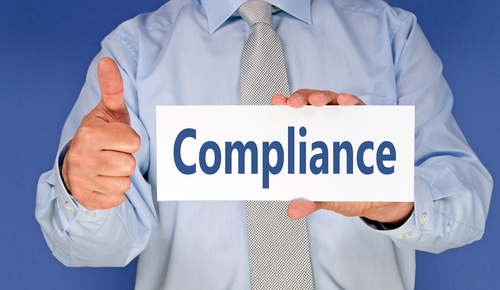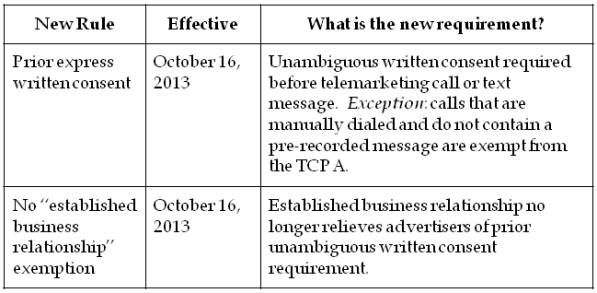
Any company that makes outbound dials on leads should be aware of the upcoming changes to the TCPA rules that state the consumer must give clear consent to be called on their cell phone by an automated dialing system. However, there is debate in many industries including the mortgage, debt and tax industries we serve, as to what constitutes clear consent.
TCPA Background:
The statute itself dates to 1991 and was enacted to give consumers a reprieve from overzealous telemarketers—particularly those employing automatic telephone dialers. The point is to prevent consumer companies from making unsolicited phone calls or sending faxes to any consumer with whom the company has no prior business relationship or who has specifically requested to be placed on a so-called Do Not Call list.
In the beginning, consumers mostly complained about unwanted faxes, now as technology has grown, there are many more complaints which include cellphones, and most recently text messages.
In 2009 the U.S. Court of Appeals for the Ninth Circuit found that text messages sent to consumers by companies and advertisers fall into the same category as phone calls and are therefore covered by the TCPA.
According to AmericanLawyer.com an online tracker of litigation data, the number of TCPA–related claims filed in 2012 increased 34 percent compared to the previous year and was more than triple the number brought in 2010.
With the increase in consumer complaints, comes an increase in regulation.
TCPA Compliance - Start Now.
On October 16th 2013 The FCC will begin enforcing new TCPA regulations requiring companies to increase their level of consumer “prior express consent” before making autodialed and/or pre-recorded marketing calls or texts to consumer cell phones. If there is a prerecorded message on the call it applies to land lines as well.
Under the new cell consent rules, the telemarketer wishing to call a cell phone will first need to obtain a signed written agreement expressly authorizing a specific entity to deliver autodialed calls or prerecorded messages for telemarketing purposes to a designated telephone number.
Consent can be from an email, website form, text message, telephone key press, or voice mail. RGR Marketing's website forms automatically capture consent so you know the leads have already given permission to be contacted. The consent language must also inform the consumer that providing consent may not be a condition of any purchase.
This type of consent can be difficult for many telemarketers to obtain, thus creating the need for wireless scrubbing, or buying leads from brokers who have already done the scrubbing for you.
So what does that mean for your business as you think of ways to reach out to your customers? Be aware! The TCPA enables individuals to file lawsuits against companies that place telemarketing calls to them without getting prior consent and the FCC’s definition of “autodialer” is very broad. Much of the “opt-in” data that you are currently using will not meet the new rigorous cell consent standards. These new rules also apply to B2B marketing practices as well, b2b marketers will need to engage in the same wireless scrubbing efforts in order to stay compliant or they need to be aware that their lead providers are capturing the consent for them on their lead pages.
How To Protect Your Business:
First know what is what and know the rules. What is a telemarketing call? What is the difference between a robocall and an autodialer? Etc. For a list of definitions visit the KMT Law Firm that has complied a nice Q&A.
You can also download a PDF of the official TCPA rules straight from the FCC website here.
The revised rules only apply to "first level" debt collection calls or texts this means that if a consumer owes money to Best Buy and they call the consumer to collect on the debt, this is ok by the new rules. If Best Buy sells the consumers debt to a 3rd party debt collector and they begin harassing the consumer , the debt collector is going to have legal issues.
If you use telemarketing or autodialing, you must first obtain a signed written agreement expressly authorizing a specific entity to deliver autodialed calls or prerecorded messages for telemarketing purposes to a phone number. The included language must also inform the consumer that providing consent may not be a condition for any purchase.
One solution to capturing digital consumer consent is the LeadiD TCPA App. This solution provides organizations a way to obtain definitive confirmation that the proper TCPA disclosures were present during the lead event and that the consumer did in fact provide prior express written consent.
“With new rules in effect this October, it is more important than ever for lead buyers to be able to know definitively if an acceptable disclosure was present on the lead form, and also document whether or not the consumer provided express consent to be contacted by the lead buyer,” said Ross Shanken, LeadiD CEO. “
Using this type of automation may help you stay in compliance more easily and give you safe-harbor against lawsuits. For instance, if you regularly scrub against a wireless number list every 15 days it will protect you in the case where you accidentally call a cell phone without consent. Again, you don’t have to worry about this if your lead provider is capturing consent for you. Make sure you ask if he is.
It is also wise to have a lawyer who knows about the new law and can help protect you if the situation arises where you find yourself in trouble.
Here's a cheat sheet courtesy of the KMT Law Firm:
Violations
Fines of up to $1,500 per individual call made in violation, as well as private civil action against the marketer of up to $500 per violation—or three times that amount if the violation was willful
Telemarkerters should act now by any means necessary getting educated, hiring a lawyer, purchasing automated tools that get them and keep them compliant before October 16th less a month from now.
From Our Perspective:
The VP of RGR Marketing, Silas Ellman had this to say about the new rules:
“We are working closely with our clients as well as our Legal counsel to make sure all parties agree on the proper interpretation of the new TCPA rules.
Today we capture consumer consent on all of our landing pages. We also work with 3rd party vendors like LeadID who can store and share that record of consent with our client base for a small additional fee. Like any new law or regulation, staying in compliance will be an evolving task and we are confident we will be 100% compliant with the new TCPA rules prior to October 16, 2013."
Tell us! How can we help you better understand TCPA Compliancy? Feel free to leave your questions and comments below.
Start making more
money today!
Search Categories
Tags
Tag Cloud
Latest from Twitter
Contact Us
Call us at 310-540-8900 or fill out the form below and we’ll tell you how you can get high quality leads for free*.
* Get up to 10% free leads on your first order!
